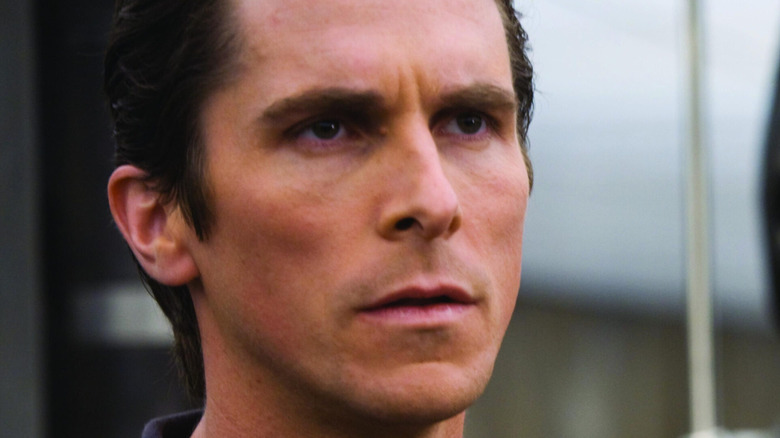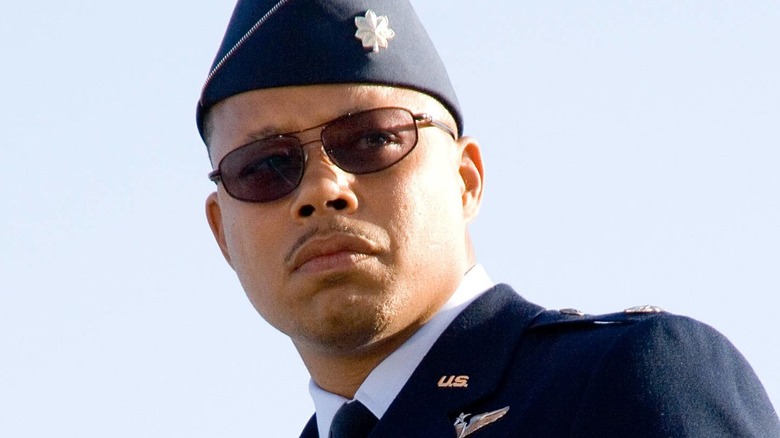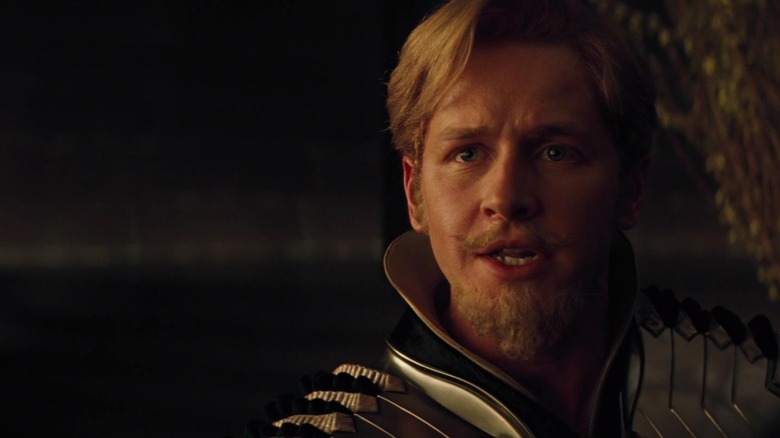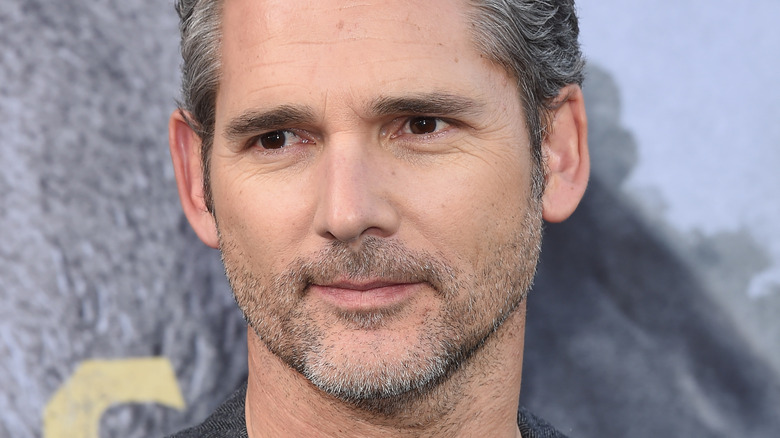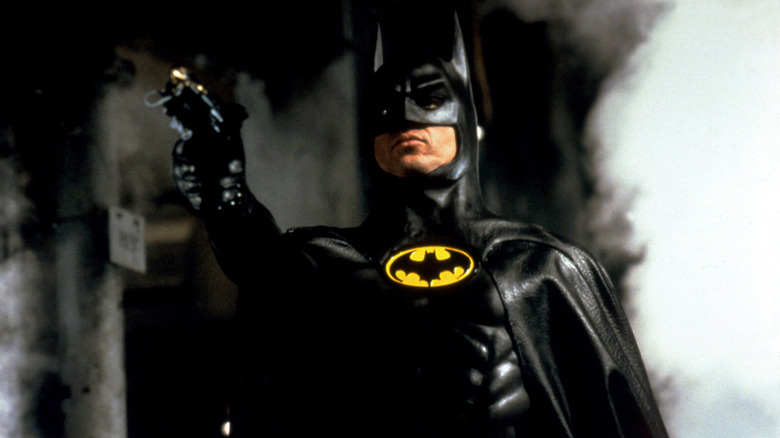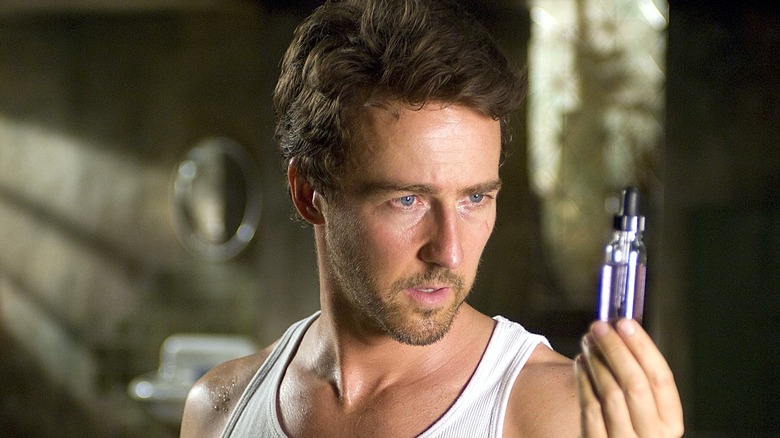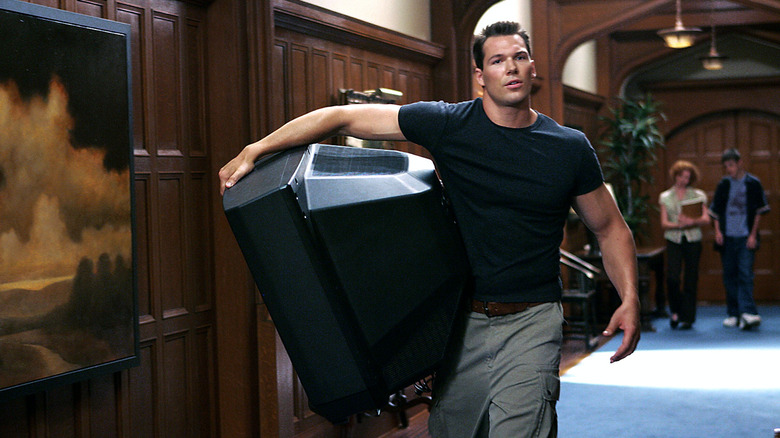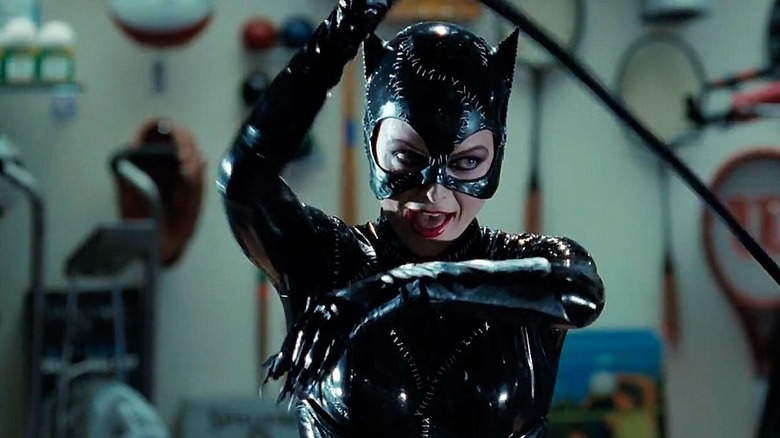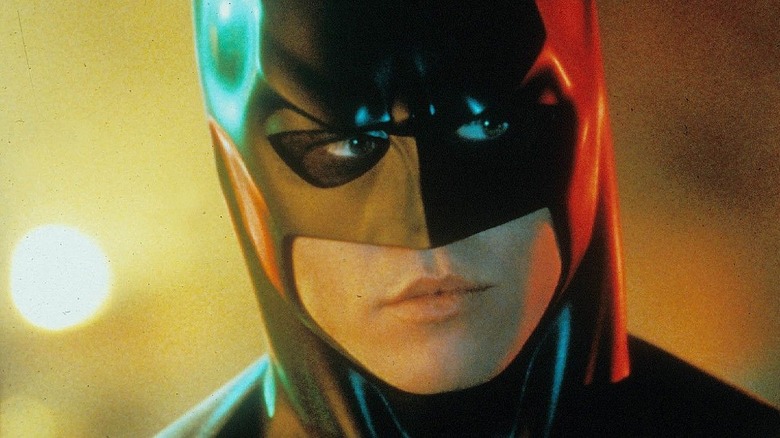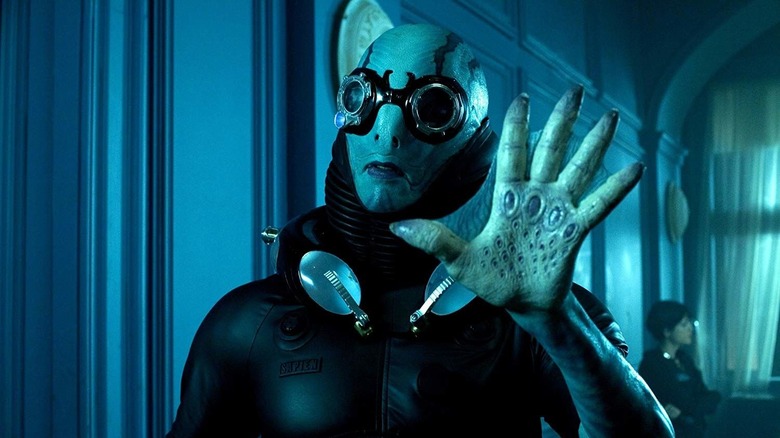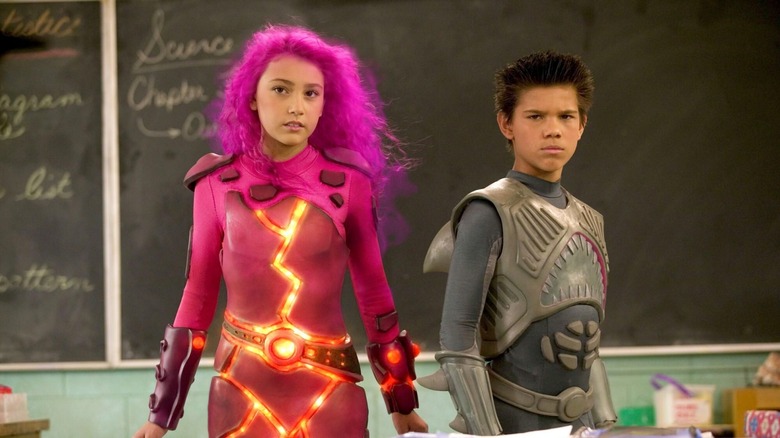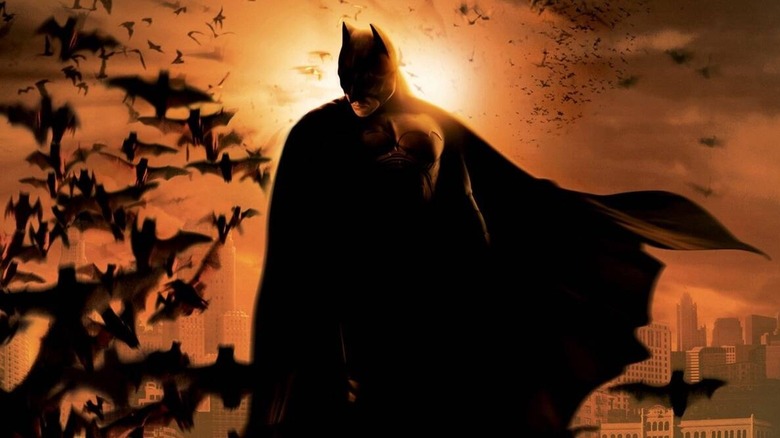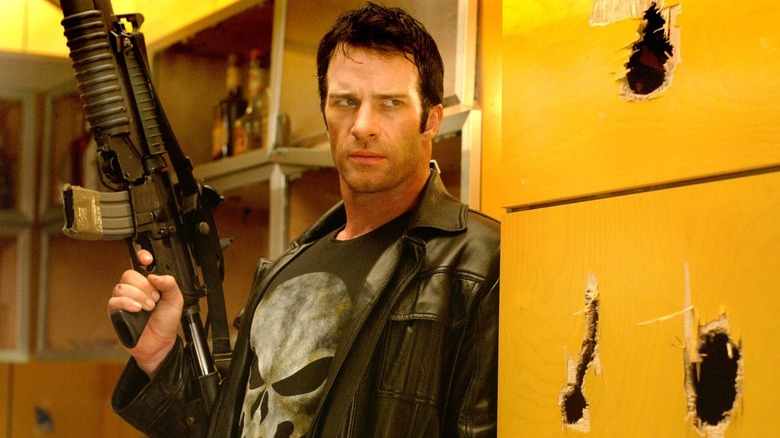The Real Reasons These Superhero Roles Were Recast
It's often said that everyone dreams about being a superhero. After all, who wouldn't want extraordinary powers like flying or super-speed? They could be so handy in everyday life, let alone in special circumstances, like an alien invasion. Many actors get the chance to inhabit this fantasy by portraying a superhero in a movie, an opportunity that can lead to incredible fame and even makes movie stars out of previously unknown talent. In countless cases, the experience of putting on a spandex-clad outfit and fighting crime on a movie set can be a fun one for a performer. Unfortunately, there have been other cases where, for a multitude of reasons, the casting just doesn't pan out and a superhero role has to be recast, cutting the dream of living out one's days as a crime-fighter short.
Given that going this route can throw a wrench into a franchise, superhero recastings aren't anyone's idea of an ideal situation, but they do happen. Whether it's because of scheduling conflicts, creative disagreements, a new filmmaking team, or any number of other causes, recasts can emerge anywhere, including in the cases of some of the biggest superhero characters of all time. The concept of becoming a superhero sounds like a dream, but the circumstances behind these superhero roles that got recast transform that concept into a nightmare.
Terrence Howard as James Rhodes/War Machine
The saga of Terrence Howard losing out on the chance to reprise the role of James Rhodes in all subsequent "Iron Man" adventures may be one of the most infamous cases of a superhero role getting recast. This is primarily because the original "Iron Man" foreshadowed the idea of Howard's Rhodes eventually suiting up as War Machine during a moment in the third act when Rhodes looks at one of Tony Stark's suits and comments, "Next time, baby!" That next time would never come for Howard, though, as he was replaced by Don Cheadle in the role.
A few years after the first movie with Cheadle as Rhodes, "Iron Man 2," hit theaters, Howard revealed on Bravo's "Watch What Happens Live" that a pay dispute led to him being dropped out of the Marvel Cinematic Universe. Apparently, as "Iron Man 2" was getting prepped, a massive pay increase for Robert Downey Jr. led to the producers revealing that Howard wouldn't be getting a similar raise. A frustrated Howard left the project in response. In the years since, Howard has done well by headlining the hit show "Empire," while Cheadle ended up becoming a critical part of the MCU with his take on War Machine.
Joshua Dallas as Fandral
The role of Fandral in the original "Thor" was plagued by casting problems. Zachary Levi was originally supposed to play the part, but when his TV show "Chuck" got its third season episode order expanded, he had to drop out of the superhero movie. After that, Stuart Townsend was supposed to play this Asgardian superhero ally to Thor as late as the start of principal photography, but, per the Hollywood Reporter, the actor eventually departed the production due to creative differences. Someone needed to take over the role, so Joshua Dallas was called in to take over as Fandral. The third time proved to be the charm, and Dallas stuck with the part. With the original "Thor" becoming a box office hit, it was inevitable that Fandral would be back with the rest of the cast for the film's sequel, "Thor: The Dark World."
Unfortunately, "Thor" wasn't the only fantasy property Dallas was acting in at the time. He was also a main character on the ABC program "Once Upon a Time." When "Thor: The Dark World" delayed its production to film during the fall of 2012, Dallas suddenly became unavailable to portray Fandral again due to scheduling conflicts with "Once Upon a Time." Once again, the character of Fandral needed recasting. This time, Zachary Levi was called in to take over in his first superhero-movie part before he inhabited the lead role in "Shazam!"
Eric Bana as Bruce Banner/The Hulk
The 2003 "Hulk" divided critics and audiences. It earned some scorn for its refusal to engage solely in action sequences and instead shift the focus of the story onto contemplations on the cyclical nature of abuse, while others praised it for eschewing superhero movie convention and daring to probe deeper ideas. When the opportunity arose to make a new "Hulk" movie, Marvel Studios had plenty of ideas for how this project would differentiate itself. One would be emphasizing an action-heavy tone, while another included finding somebody new to take over the role of Bruce Banner/Hulk from Eric Bana, who portrayed the character in "Hulk."
This actor never got to make a case for reprising this role under a different creative team. In 2021, Bana revealed on Marc Maron's podcast that he was never even asked to come back for "The Incredible Hulk," due to the studio's desire to send the next "Hulk" movie in a new direction creatively. This turned out to be an especially peculiar choice in hindsight, given that "The Incredible Hulk" picks up with Bruce Banner residing in South America, the country he was hiding out in at the end of "Hulk." Even with this potential connective tissue, it's apparent that everyone behind "The Incredible Hulk" just wasn't interested in seeing Bana return to the role despite the cult following his "Hulk" movie had developed.
Michael Keaton as Bruce Wayne/Batman
Michael Keaton was not somebody fans initially had in mind to play Batman when he was first cast in the role in the 1980s. However, that backlash quickly turned into adoration when fans got to watch a "Batman" film headlined by Keaton, and the man quickly became synonymous with the DC Comics superhero. Unfortunately, no actor stays with a role forever, and Keaton vacated the part after portraying Batman just twice. Given how well-received he was in the role, it begs the question of why the part was recast for "Batman Forever."
In a 2022 interview with the Hollywood Reporter, Keaton recounted how, when the opportunity to play the Caped Crusader for a third time came up, he just felt he couldn't do it anymore. Val Kilmer and George Clooney took over this superhero role in the next two "Batman" movies, to much less acclaim than Keaton's incarnation. For those who consider Keaton's take to be the definitive one, there is good news on the horizon: Unlike most other superhero actors whose roles are recast, Keaton eventually returned to the Batman role in "The Flash."
Edward Norton as Bruce Banner/The Hulk
In 2010, just a few weeks before the San Diego Comic-Con reveal of the official cast of "The Avengers," a bombshell hit the internet: Edward Norton would not be reprising his role as Bruce Banner/The Hulk from "The Incredible Hulk" in this team-up movie. A search began for a replacement, and Mark Ruffalo took on a part that he's continued to play for an entire decade and counting. With the dust having settled on such a monumental piece of recasting, it begs the question: What happened here? Why did Norton get recast?
In the immediate aftermath of this development, producer Kevin Feige claimed in a statement that the recasting was necessary to get a performer who could work well in an ensemble cast, a potential reference to creative disputes between the company and Norton on "The Incredible Hulk." Immediately after this claim was made, Norton released a statement expressing appreciation for fans supporting his take on the Hulk, but not delving into the nitty-gritty behind this recasting. In 2014, Norton revealed his side of things by explaining in an NPR interview that he had walked away from the role voluntarily out of fear of the consequences of working for so long inhabiting one role. Wanting to ensure he could have variety in his career, Norton eschewed the opportunity to play this superhero again when it came time for "The Avengers." This decision engendered one of the most famous examples of superhero recasting in cinematic history.
Daniel Cudmore as Colossus
Daniel Cudmore first portrayed Colossus in "X2" before reprising the part in a substantially increased capacity for "X-Men: The Last Stand" and then returning as one of the mutant fighters of the future in "X-Men: Days of Future Past." Across a trio of appearances, it would seem like Cudmore had solidified himself as the go-to person to play Colossus. However, that all changed with "Deadpool," which featured the mutant as a prominent character, but with a different performer inhabiting the role.
This was no accident, but rather a conscious choice on the part of the film's director, Tim Miller, who revealed to Empire that he'd always felt like the traditional film version of Colossus was inaccurate to the comics, and opted to reimagine the superhero as a 7-foot-tall, fully-CG being for "Deadpool." He also noted that Cudmore had been approached to play the role but had declined. This was a scenario the actor himself confirmed on Twitter, noting that he'd been asked solely to lend his physical likeness for Colossus' face, while someone else would dub over his voice. Stefan Kapičić would eventually provide the voice for the character, while Andre Tricoteux served as the on-set stand-in for Colossus. Though a heavy departure from the casting norms of the "X-Men" films, these maneuvers paid off, as "Deadpool's" take on Colossus turned into a fan-favorite character.
Michelle Pfeiffer as Catwoman
2004's "Catwoman" got clawed by critics for how much it deviated from the comics, with the titular character not being named Selina Kyle or even living in Gotham City. Initially, though, a solo Catwoman film was meant to be directly connected to the established cinematic Batman mythos: In the wake of Michelle Pfeiffer's acclaimed turn as the character in "Batman Returns," a spin-off was commissioned that even had "Returns" director Tim Burton briefly on board to direct. All signs appeared to be good that this project would become a reality.
However, in 1995, Pfeiffer revealed to The New York Times that, while she was still interested in reprising the role of Catwoman, she had a newly packed schedule that would likely prevent her from appearing in a "Catwoman" spin-off movie in the near future. After a lengthy search, Halle Berry was selected to take over the lead role in a production which had evolved into a standalone project divorced from the earlier "Batman" features. Hot off an Oscar win for "Monster's Ball" and her work as Storm in "X-Men," Berry likely seemed a perfect pick for "Catwoman." Perhaps she could've been a great Catwoman under the right circumstances, though the final cut of "Catwoman" did not properly utilize her or the titular character.
Val Kilmer as Bruce Wayne/Batman
After Val Kilmer took over the role of Batman from Michael Keaton, it's doubtful the movie's producers wanted to recast the role yet again, particularly given their desire to get a "Batman Forever" sequel released just two years after that movie's theatrical debut. However, "Batman and Robin" once again found a new performer inhabiting the cape and cowl, with George Clooney taking over the part. Decades after this recasting, it's still not widely known why Kilmer bid farewell to playing Batman after just one performance.
In the documentary "Val," Kilmer details the struggles he experienced in playing the role, including his limited mobility and difficulties in even hearing other actors while wearing the Batman costume. This resulted in him feeling isolated from everyone else in the cast, which made Kilmer miserable on the set. Add to that his displeasure with his on-screen performance in "Batman Forever" and it seems a no-brainer for the actor to pass on the chance to return for "Batman and Robin." Though Batman may be one of the most famous superheroes ever created, Kilmer's problems portraying the character reflect why it's been so difficult for this franchise to retain a long-term star.
David Hyde Pierce as Abe Sapien
In the original "Hellboy," the titular superhero's aquatic friend Abe Sapien was portrayed on-screen by Guillermo del Toro regular Doug Jones. He did not, however, provide the character's voice — those duties went to David Hyde Pierce. Given his naturally intellectual-sounding pipes, as well as his experience providing vocals for projects like "A Bug's Life" and "Treasure Planet," it's understandable why Pierce would be seen as a fine choice. However, during the production of the original film, Pierce refused to be credited for his work or even promote his participation in the movie due to his enormous respect for the on-set acting of Jones.
Given Pierce's affection for the work of Doug Jones, it's no wonder the actor didn't provide the voice work for Sapien beyond one film. Talking to Comic Book Resources, Jones revealed that, when director Guillermo del Toro first revealed to him that he was being dubbed over for the original "Hellboy," the filmmaker also said that he wanted Jones to be retained as Sapien's voice actor for a potential sequel. Additionally, positive fan response to the voice work Jones supplied for the character in a pair of direct-to-video animated "Hellboy" movies helped solidify Jones' opportunity to voice Abe Sapien in the next live-action "Hellboy" feature. He got just that opportunity with "Hellboy II: The Golden Army."
Taylor Lautner as Sharkboy
Long before he redefined werewolves as creatures whose human forms must have abs, Taylor Lautner played the adolescent superhero Sharkboy in the Robert Rodriguez film "The Adventures of Sharkboy and Lavagirl in 3D." In Rodriguez's attempt to replicate the lightning-in-a-bottle success of his "Spy Kids" features, Lautner's Sharkboy was exactly what he sounded like: a kid who, after getting raised by a pack of sharks, gained various abilities related to sharks, including a sharp bite.
Though the original "Spy Kids" spawned a trio of sequels within just 10 years of its debut, "The Adventures of Sharkboy and Lavagirl in 3D" didn't quite catch on as much with moviegoers at the box office, according to industry tracking site The Numbers. As a result, Lautner and Taylor Dooley (who portrayed the titular Lavagirl) didn't return for any direct follow-ups to this film in the years immediately following its release. For a while, it seemed like these two would be the rare cinematic superheroes who never received any kind of sequel. However, in 2020, Rodriguez directed "We Can Be Heroes," which featured grown-up versions of Sharkboy and Lavagirl. While Dooley reprised her superhero role, Lautner was unable to return due to scheduling conflicts, leaving JJ Dashnaw to take over the part.
Christian Bale as Bruce Wayne/Batman
After playing the role of Batman for three movies over seven years, you'd think Christian Bale would've had his fill of this character and wouldn't even want to see a Batarang. But in November 2014, Bale made a surprising revelation to Empire (via The Telegraph) that he did want to play the character again, in a scene as momentous as the character meeting Superman for the first time on the big screen. However, the project he was referring to, "Batman v. Superman: Dawn of Justice," introduced Ben Affleck as the Caped Crusader instead.
Though Bale may have been willing to return to the part, "Justice" director Zack Snyder never considered the actor for the role of Batman. Talking to FilmInk, Snyder said he felt it was instrumental his film didn't utilize Bale because he felt that stylized sci-fi elements like Superman couldn't exist within the original grounded Christopher Nolan trilogy of "Batman" movies. Bringing back Bale may have made some fanboys happy, but it would have disrupted the aesthetic of a seminal collection of "Batman" features. Plus, Snyder wanted the opportunity to establish the universe of "Dawn of Justice" as distinctly different from past takes on "Batman." These creative ambitions drove Snyder to deliver something unique with his superhero films, even if they did also deprive Bale of a chance to return as Batman.
Thomas Jane as Frank Castle/The Punisher
The 2004 film "The Punisher," starring Thomas Jane as the titular anti-hero, was not a massive smash hit, but it proved profitable enough to warrant a sequel. The journey to get another live-action film based on the exploits of The Punisher off the ground was a long one. Throughout screenwriter change-ups and various release date delays, Jane stayed signed on to reprise his superhero role. By the time the summer of 2007 rolled around, however, this prospective "Punisher" sequel was dealt with a big blow when he walked away from the project (per Cinemablend).
In a letter to the fans, Jane explained that he wasn't satisfied with the most recent screenplay and, despite having a fondness for the character, opted not to return to the role. For a moment, it looked like that would be the end of the Punisher's time on the big screen. Just a few weeks after Jane left the film, though, Lexi Alexander signed on to direct what would become the reboot "Punisher: War Zone." With a director in place, it was time to get a new actor to portray The Punisher. The feature eventually settled on Ray Stevenson as the ideal guy to take over the character. Even if Jane wasn't around, this "Punisher" show would go on with a new performer.
